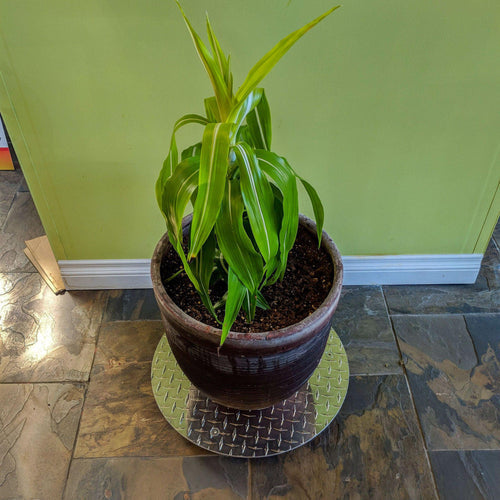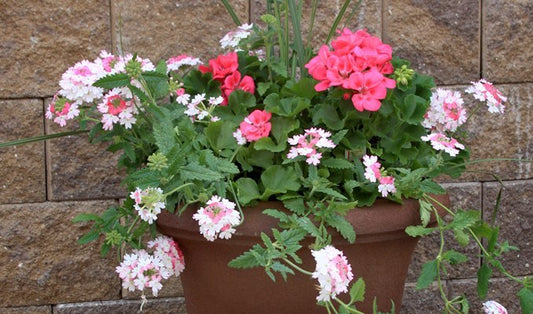Yes, many of us know that gardening is good for us. Yes, many of us know that indoor gardening offers the same benefits to our health and physical mobility/agility. But there are still people that are afraid to take the plunge and try to grow an herb garden or grow tomatoes in their yard. The good news is, houseplants are relatively low maintenance and can significantly improve an indoor living space with much less work.
Houseplants are great too, in that there are many different types to fit your home’s decor and your lifestyle. You can choose to grow air plants that only needed to be misted with water once a week or so. You can opt for smaller container plants that will set on a coffee table, your desk, on top of your kitchen cabinets, or add a stainless steel floating shelf to house them. Or you can go all out and buy large potted plants (remember to put them on a rolling plant caddy to make moving them easier!) that fill an entire corner of a room.
Regardless of the size, you’re still going to see an improvement in the air quality, in your mental health, in how productive you are, and how well you sleep.
Air Quality Benefits
The quality of the air we breathe has a big impact on not only our overall health but also how we feel on a day to day basis. Indoor air quality is considerably worse than the air outdoors, especially when it isn’t mixed with fresh air regularly. Adding houseplants to your space can improve the air in your home significantly.
- Filter toxins: Research conducted by NASA has proven plants play a pivotal role in improving air quality. Not only do they help to reduce carbon dioxide levels, but they filter harmful chemicals out of the air too. They have the ability to remove almost 90% of all volatile organic compounds (VOCs) including formaldehyde, trichloroethylene, benzene, carbon monoxide, ammonia, and xylene.
- Some of the best species for air purification are azalea, bamboo palm, chrysanthemum, English ivy, gerbera daisy, golden pothos, snake plant, peace lily, red-edge dracaena, and spider plants
- Increase oxygen levels: During the photosynthesis process, plants use their leaves to absorb carbon dioxide from the air to create food. They then release oxygen as a byproduct for all living organisms to use in respiration.
Mental Health Benefits
Having houseplants also helps put you in a better mood, in a variety of different ways.
- Relieves stress: While the mechanism isn't fully understood, 30-minutes of gardening can significantly reduce cortisol levels (the stress hormone) in the body.
- Helps lift depression and boost the mental outlook: There’s a natural tendency for people who garden, to want to talk about it with other gardening friends. This opens up communication with friends and neighbors and increases social interaction. In turn, depression lessens and your mental outlook improves.
- Reduces dementia and Alzheimer’s: The repetitive actions of gardening that strengthen your hands also help to calm your mind. This action, when coupled with learning how to tend to plants, problem-solving, and sensory awareness are thought to be key factors in keeping your brain sharp as you age.
- Boosts self-esteem: Caring for something that is living, and keeping it alive makes us feel good about ourselves, giving us a sense of accomplishment.
Productivity Benefits
Working from a home office has many perks, but at times it can be challenging to achieve the same productivity as a typical office setting. Adding houseplants to your office space can help. Place a couple of large potted plants near the doorway leading to the other areas of the home, and one -- or two -- on your desk.
- Reduces noise distractions: Plants have the natural ability to absorb sounds, buffering some of the background noise that occurs in many homes and reducing distractions.
- Boost creativity: Studies have shown approximately a 15% increase in creativity when people have natural elements in their workspace. This is thought to be related to the calming effect they invoke.
- Better memory retention: Stress and anxiety are known to impact both short term and long-term memory. Memory retention is seen to improve up to 20% when research subjects are in close proximity to plants.
- Increased ability to concentrate: There is a direct correlation between carbon dioxide levels and your brain’s ability to think clearly. When plants reduce the carbon dioxide level in the air you can focus better on the work you’re doing, and for longer stretches of time.
Sleep Benefits
Having plants in your bedroom even helps you sleep better! Putting one or two in your bedroom aids in a more restful night’s sleep.
- Higher oxygen levels: During the day plants give off a considerable amount of oxygen and reduce the carbon dioxide levels in the air. When the sun goes down most plants stop photosynthesizing for the night. There are a handful of plants though, such as bromeliads, orchids, and succulents that absorb carbon dioxide during the day and release oxygen at night.
- Sleep inducing fragrance: The scent from plants such as lavender, jasmine, and gardenia is known to calm your nerves and help you sleep.
With all these great benefits, find a houseplant or two and enjoy what they have to offer!





